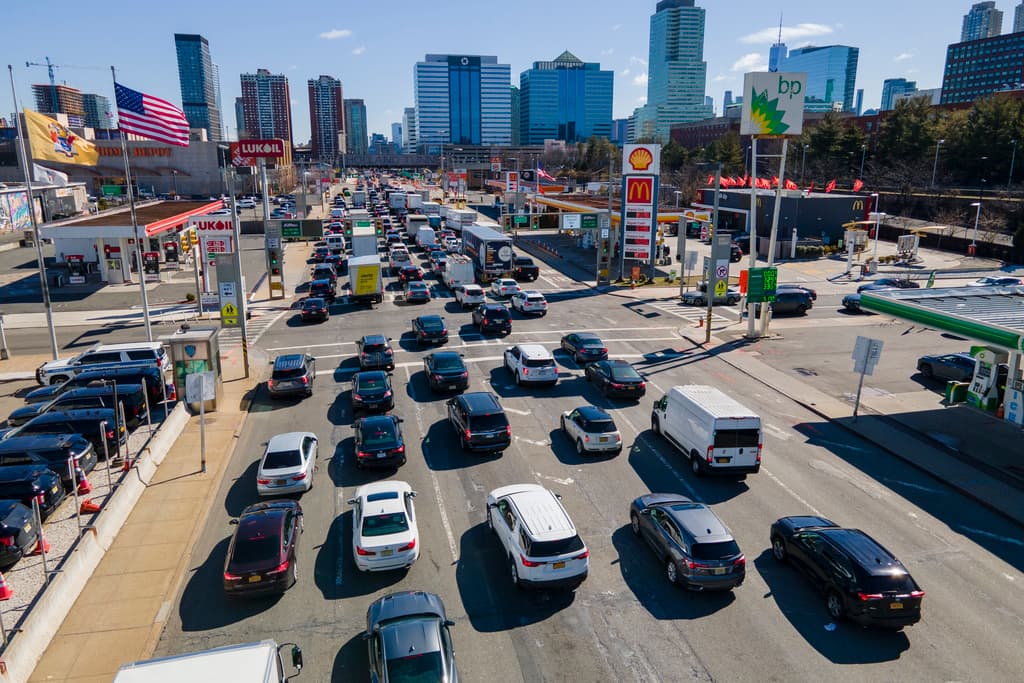The Trump Effect Halts Congestion Pricing
The tolling scheme is the kind of governmental extortion that gives highway robbery a bad name.

Now that Governor Hochul has — in what the Times calls a “stunning” reversal — halted the congestion pricing scheme that would have tolled drivers $15 for the privilege of entering lower Manhattan, will the Metropolitan Transportation Authority clean up its budgetary act? The MTA, after all, was the driving force for the plan for extracting $1 billion a year from area motorists to bail out the transit agency’s self-made budgetary disaster.
The scheme, though framed as a high-minded effort to improve the environment and reduce street traffic, is the kind of governmental extortion that gives highway robbery a bad name. Even worse, the MTA wouldn’t even need the money if it were managed properly. Feature the fact that the agency is losing nearly $700 million a year to fare evasion — the rules against which it refuses to enforce for fear of being accused of racism.
Were the MTA a private corporation, its management — and board — would have been cashiered by the shareholders long ago for such ineptitude. If it were an elected body, its leaders would have been voted out of office. The trouble is, the MTA is neither. It’s a quasi-governmental authority, nominally controlled by the governor, but not accountable to its customers or the voters. The congestion pricing toll plan was prima facie evidence of that.
Who else, other than an agency of unelected bureaucrats, would dare to impose such a burden on local residents with such little justification? The arguments for the tolls are as flimsy as they come, but the key delusion is that the tolls would encourage drivers to use mass transit. If that were the case, why hasn’t the MTA — along with the Garden State’s already overstretched NJ Transit — been ramping up capacity and service to meet the expected demand?
The transit agencies’s failure to do so was among the logical lapses that marked the tolling scheme. It was also perplexing for New York — still struggling to recover from the Covid pandemic, urging employees to return to the office, and in need of shoppers and theatergoers to return to Midtown — to embrace a policy that would, as Mrs. Hochul crowed last year, lead to “significantly fewer vehicles in central Manhattan every day.”
It amounted to “yet another incentive to stay home,” as our Dean Karayanis put it. “Commuters and the cars that carry them,” he added, “which are already subject to tolls at bridges and tunnels,” are “the lifeblood of Gotham.” That’s among the reasons why Mrs. Hochul’s decision is good news for the city’s economy. At the risk of appearing cynical, though, it’s hard to avoid the possibility that election year politics are behind the governor’s move.
The Times contends it could help “her fellow Democrats in the House who might otherwise face angry voters in an election year.” What about “the big guy,” though? President Biden had the ultimate say over the tolls, via the Federal Highway Authority, which okayed the plan last summer. Could recent polls showing Mr. Biden with but a single digit lead over President Trump in New York have amounted to a flashing red light for the congestion tolls?
The Queens native, and GOP front-runner, last month assailed the congestion pricing proposal on his Truth Social platform. “I can’t believe,” he wrote, “that New York City is instituting Congestion Pricing.” Under the pricing scheme, Mr. Trump added, “everyone has to pay a fortune for the ‘privilege’ of coming into the City, which is in desperate trouble without it.” If Mr. Trump’s stance helped move the needle on this issue, New York is in his debt.
Yet if election-year politics can give, they can also take. It’s easy to envision the toll plan being revived if Mr. Biden wins re-election. Even worse, Mrs. Hochul’s plan to make up for the MTA’s lost revenue from the tolls isn’t to cut the waste at the transit agency, or resume collecting subway fares. Instead, the Times reports, “to fill the $1 billion yearly gap,” she’s considering that default reflex of the Democratic Party — “a tax on New York City businesses.”

